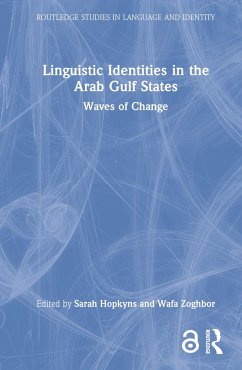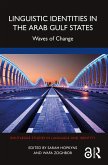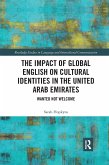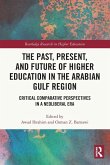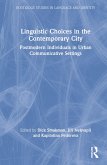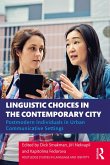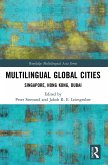Combining empirical and theoretical approaches from a range of disciplines, Linguistic Identities in the Arab Gulf States examines current issues surrounding language and identity in the Arab Gulf states. Organized in four parts, the book addresses the overarching theme of 'waves of change' in relation to language and power, linguistic identities in the media, identities in transition, and language in education.
The authors of each chapter are renowned experts in their field and contribute to furthering our understanding of the dynamic, changeable, and socially constructed nature of identities and how identities are often intricately woven into and impacted by local and global developments. Although the book geographically covers Gulf region contexts, many of the concepts and dilemmas discussed are relevant to other highly diverse nations globally. For example, debates surrounding tolerance, diversity, neoliberal ideologies in English-medium instruction (EMI), media representation of language varieties, and sociolinguistic inequalities during coronavirus communication are pertinent to regions outside the Gulf, too.
This volume will particularly appeal to students and scholars interested in issues around language and identity, gender, language policy and planning, multilingualism, translingual practice, language in education, and language ideologies.
The authors of each chapter are renowned experts in their field and contribute to furthering our understanding of the dynamic, changeable, and socially constructed nature of identities and how identities are often intricately woven into and impacted by local and global developments. Although the book geographically covers Gulf region contexts, many of the concepts and dilemmas discussed are relevant to other highly diverse nations globally. For example, debates surrounding tolerance, diversity, neoliberal ideologies in English-medium instruction (EMI), media representation of language varieties, and sociolinguistic inequalities during coronavirus communication are pertinent to regions outside the Gulf, too.
This volume will particularly appeal to students and scholars interested in issues around language and identity, gender, language policy and planning, multilingualism, translingual practice, language in education, and language ideologies.
"A powerful, insightful, timely, diverse, and well-presented volume on the complexity of the multilingual context of the Gulf countries. This book is a must-read for any researcher, education policy maker, graduate and undergraduate student interested in the role of language in society, assessing multilingual development, language, identity and investment, language policy and planning, language and power, and linguistic landscape."
Ahmad Al-Issa, Professor, College of Arts and Science, American University of Sharjah, UAE
"This edited volume demonstrates the significance in adopting a context-sensitive approach to researching language, identity and culture. It provides rich insights into the changing language policy, ideologies and practices in the Gulf region, as well as key global issues such as inequality, migration and cultural changes. It is a timely addition to the growing body of critical literature in applied linguistics."
Zhu Hua, Professor of Language Learning and Intercultural Communication, UCL Institute of Education, UCL, UK.
"Drawing on recent developments in identity, ideology and emotion research, this exciting volume gives readers fresh insights into how the multilingual ecologies of the Arab Gulf States are evolving in relation to contemporary phenomena like globalization and neoliberalism. This book is a must-read for applied linguists who are interested in language policy and practice issues in the Gulf region and beyond."
Peter De Costa, Associate Professor, Department of Linguistics, Languages, and Culture and the Department of Teacher Education, Michigan State University, USA.
Ahmad Al-Issa, Professor, College of Arts and Science, American University of Sharjah, UAE
"This edited volume demonstrates the significance in adopting a context-sensitive approach to researching language, identity and culture. It provides rich insights into the changing language policy, ideologies and practices in the Gulf region, as well as key global issues such as inequality, migration and cultural changes. It is a timely addition to the growing body of critical literature in applied linguistics."
Zhu Hua, Professor of Language Learning and Intercultural Communication, UCL Institute of Education, UCL, UK.
"Drawing on recent developments in identity, ideology and emotion research, this exciting volume gives readers fresh insights into how the multilingual ecologies of the Arab Gulf States are evolving in relation to contemporary phenomena like globalization and neoliberalism. This book is a must-read for applied linguists who are interested in language policy and practice issues in the Gulf region and beyond."
Peter De Costa, Associate Professor, Department of Linguistics, Languages, and Culture and the Department of Teacher Education, Michigan State University, USA.

